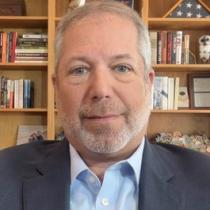Veterans Day: Why We Serve, Why I Served
Veterans Day: Why We Serve, Why I Served
By Mark R. Jacobson, PhD USN (Ret.), Board of Directors, Pritzker Military Museum & Library

When I thank fellow veterans for their service, what I really want to ask is: Why did you serve? It's a little too personal for small talk, and not everyone has the time or interest to go that deep. Still, on Veterans Day, as we pause to honor those who wore the uniform, it's worth asking ourselves why people choose that path—and how it changes them.
Ask one of the 18 million living veterans why they served, and you’ll get 18 million answers. It’s rarely a simple question. Some enlist out of family tradition, following parents or grandparents into service. Others are driven by patriotism, by a desire to defend something larger than themselves. Some are looking for education benefits or a way out of a difficult situation. And some were drafted and never chose military service at all. Whatever the reason, that initial motivation matters—but it's only the beginning of the story.
My own path began in the autumn of 1993, when I signed my name on the dotted line for an enlistment in the U.S. Army. We were no longer in a Cold War, but U.S. forces were engaged in a peacekeeping mission that was about to become hot in Somalia, and discussions loomed regarding a U.S. and NATO mission to the Balkans—where my unit was likely headed. Still, these conflicts weren't my sole motivation to enlist—and it certainly wasn't my Pearl Harbor or 9/11.
Military service was present in my broader family but not really a tradition. Great-uncles fought during World War II, a few older cousins were drafted for Vietnam, my father served in postwar Germany, and one ancestor rode with the 9th Michigan Cavalry during the Civil War. But that wasn't why I enlisted. I had a sense of duty—a belief that if I was going to be a senior civilian policymaker in the national security arena (my chosen path at that point), I had a duty to serve on the ground floor first. I wanted to avoid a personal disconnect between "those who fight and those who decide."
That's one person's reason. Ask another veteran and you'll hear something entirely different. One of the things I value most about serving on the board of the Pritzker Military Museum & Library is the organization’s focus on the "Citizen Soldier"—the idea that whether you're a draftee or a volunteer, active or reserve, every veteran shares the same journey from civilian life to uniformed service and back again. That shared experience matters more than the varied reasons that brought us there.
That path evolves for those who serve once you're in. Those initial motivations may start to fade, especially if you deploy to a combat zone. The ideals of duty, honor, freedom, and mission still matter, but they become filtered through something more immediate—the bonds you develop with the soldiers, sailors, airmen, and Marines standing on your left and your right. As writers like J. Glenn Gray and Tim O'Brien have explored in their seminal works, going to war can subordinate even the most noble abstract concepts of "why we fight" to the more tangible bond with your comrades. Whether at Gettysburg, Guadalcanal, Bastogne, Ia Drang, Fallujah, or Korengal, our veterans carried each other and fought for their buddies. The meaning of service narrows and deepens—you fight to protect the person next to you, because they would do the same for you. This becomes the real heart of military service: not for oneself but for others.
And that experience will change you permanently. It's not something you leave behind when you take off the uniform. Many veterans return to civilian life carrying that sense of purpose, that bone-deep understanding that meaning comes from serving something beyond yourself. Sometimes service is a treasure—a compass that guides them toward continued service in their communities, their professions, their families. Other times it's a burden, when that sense of purpose has no outlet or when the transition back to civilian life doesn't provide the same sense of mission.
The late Senator John McCain, himself a veteran and prisoner of war, put it this way: "Our identities and sense of worth are not circumscribed but enlarged by serving good causes bigger than ourselves." That enlargement of identity and purpose is the lasting mark of military service. It's what many veterans spend the rest of their lives trying to honor, replicate, or reconcile.
When we celebrate Veterans Day, we should do more than thank people for something they once did. We must recognize that they were changed by that choice—that the decision to serve, regardless of the initial reason, created in them something good that endures. Our role is understanding that transformation, acknowledging that permanent shift in how veterans see their place in the world, and helping them rediscover that sense of service if it’s faded. That’s how we build a deeper appreciation for their sacrifice and for what they bring to our communities and their jobs. It helps us see that military service isn't just a chapter in someone's past. It's a thread that runs through everything that comes after.
Mark R. Jacobson enlisted in the U.S. Army Reserves in 1993 and served for seven years, including as part of the NATO peacekeeping mission in Bosnia in 1996–1997. In 2001, he received a commission in the U.S. Navy Reserves, where he served for 20 years as an intelligence officer, including a deployment to Afghanistan in 2006.